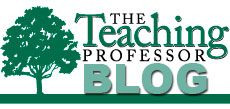By: Maryellen Weimer, PhD in Teaching Professor Blog
Our interest in more learner-centered instruction has changed the way many of us think about teaching as well as what we do in the classroom. We are devoting more energy to getting students involved during class. We are trying to give them more opportunities to practice those learning skills that expedite learning. We let them summarize the content; rather than doing it for them. We try to have them ask more questions than we do. We design activities which encourage them to learn from and with each other.
But as two articles highlighted in the February issue of The Teaching Professor newsletter point out, those changes have not been accompanied by corresponding changes in assessment practices. The evaluation of student work remains completely under teacher control. Now don’t stop reading, because the point is not that students should be grading their own work. That’s an abrogation of legitimate instructor responsibility and that’s not what this is about.
What we’re talking about here is the fact that students do need to develop self assessment skills. They need to be able to look at their own work and with some accuracy assess its merits. That includes the work they do in our courses. As authors Nicol and Macfarlane-Dick point out, students already do make judgments about their work and performance. They write something in a paper and ask themselves if they’ve written enough, if what they’ve written makes sense, if they’ve said what they think the professor wants them to say, if they put the references in the right format, or if their solution is correct. And they answer those questions which means they are giving themselves feedback. So, why, ask these authors, aren’t we intervening during this process and doing what we can to improve their self-assessment skills?
How could we intervene? Well, we could do what we still do more than we should—tell students how they should assess their work. But that’s another version of the information transmission teaching model and it doesn’t work nearly as well as letting students practice the skill we wish them to develop. So, students need to participate in activities where they look at their own work and the work of others. They can develop what Sadler calls “appraisal expertise” by generating assessment criteria, making rubrics or looking at potential criteria and assessing their relevance. They develop the ability to self-assess by reviewing examples and applying assessment criteria to those examples. Sadler advocates “intensive use of purposeful peer assessment.” (p. 548) Looking at the work of others prepares students to look critically at their own work.
Of course the grading issue complicates the development of these skills. How likely are students to share honest evaluations of their work with the teacher who is the ultimate assessor? If you were in their shoes, would you point out weak parts of your paper to the teacher? Probably not, but you might do it if the paper could still be revised, and there are some ways of interacting with the teacher about your work that do address these self-assessment skills. What if the student generates two or three questions about the work that they would like teacher feedback to address? What if after receiving teacher feedback, the student prepares a short memo that describes how that feedback is going to be addressed in the next piece of work and then in next piece of work identifies examples of where the feedback has been acted on.
I think fears about students’ motivation to get high grades (even if they don’t deserve them) has caused most of us to conclude that students can’t be a part of the assessment process. I realized after reading these articles that leaving them out means they may never fully develop these critical self assessment skills on their own and we should explore practical ways they can be involved.
References:
Sadler, D. R. (2010). Beyond feedback: Developing student capability in complex appraisal. Assessment & Evaluation in Higher Education, 35 (5), 535-550.
Nicol, D. J. and Mcfarlane-Dick, D. (2007). Formative assessment and self-regulated learning: A model and seven principles of good feedback practice. Studies in Higher Education, 31 (2), 199-218.


No comments:
Post a Comment